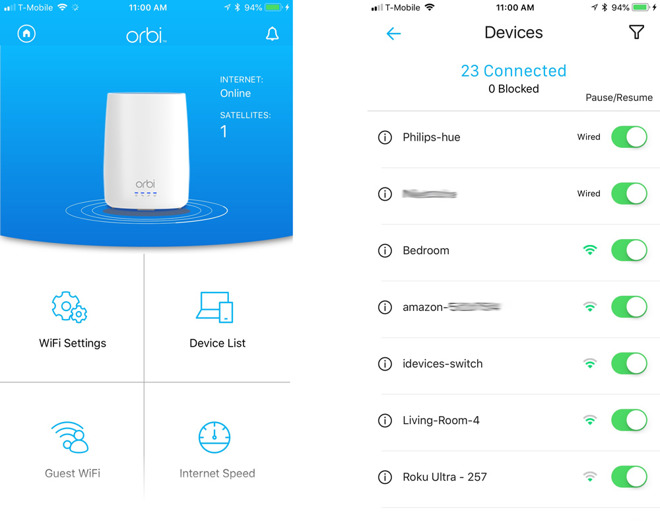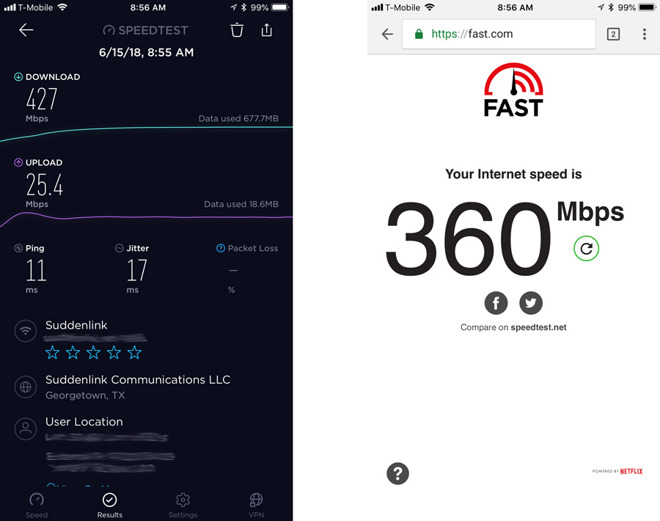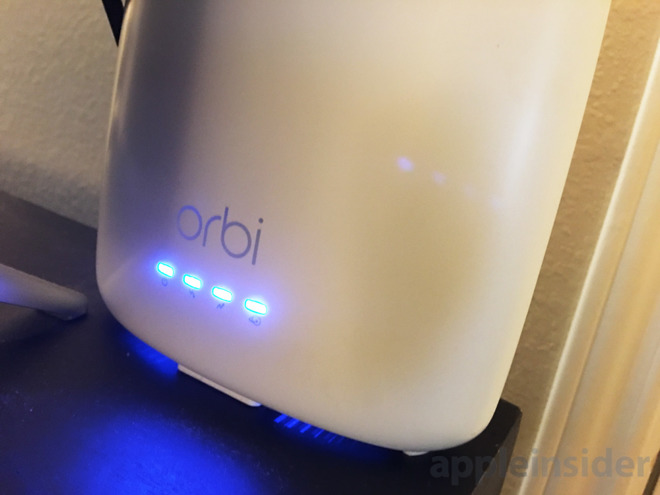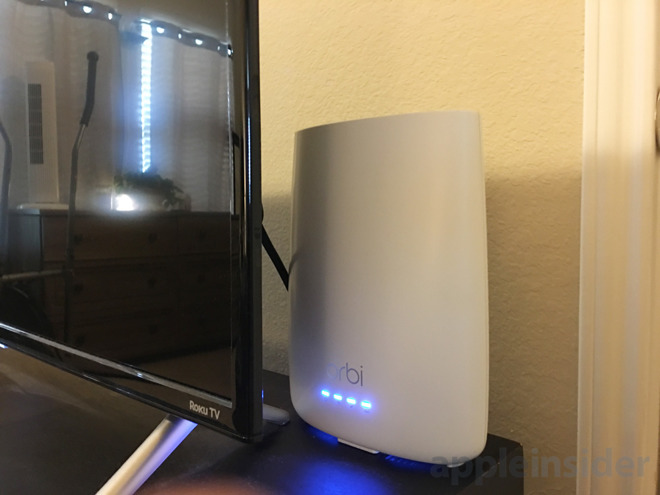Review: Netgear's Cable Orbi Kit delivers fast whole-home Wi-Fi
The Netgear Cable Orbi is a quality -- if pricey -- all-in-one package, potentially ideal for people looking to escape modem rentals and leap into mesh Wi-Fi at the same time.
Mesh systems seem to be the future of Wi-Fi. They're probably overkill if you live in an apartment, but homes and businesses are so often saturated with internet-connected devices that it's essential to eliminate dead spots, especially when it comes to smarthome accessories like security cameras.
The gist of the mesh concept is that on top of a primary router, you can connect one or more satellite units that seamlessly widen your network without requiring multiple SSIDs, as with normal Wi-Fi extenders. Mobile devices will automatically switch access points as you roam.
Unlike some mesh systems, the Cable Orbi comes with just two components: a combination modem/router and a single satellite. Local Wi-Fi bandwidth tops out at 2.2 gigabits per second, split between two 866-megabit channels and one 400-megabit path. One of these is a dedicated 5-gigahertz backhaul for the satellite access point, ensuring that speeds don't drop off dramatically away from the router. The router also has four gigabit Ethernet ports, while the satellite has two.
This is all pretty similar to Netgear's existing Orbi models. What's new of course is the modem, which delivers 32x8 DOCSIS 3.0 with up to 1.4 gigabits of bandwidth, more than enough for current home connections. Some people have complained that it's not futureproof without DOCSIS 3.1, but that technology is still expensive, and even a Google Fiber connection is unlikely to max it out.
The Netgear Orbi app for iPhones and iPads does a pretty good job of guiding users through the setup process, which is of course more complicated for the Cable Orbi since you'll need to contact your ISP and supply them with a MAC address and/or serial number. Set aside some time for installation -- even if your hardware works perfectly, you might still run into provisioning problems with your ISP, and you may have to manually reconnect household devices.

In our case we ended up rebooting the Orbi a few times, stopping midway through to configure as much of the rest of the product as we could. More than likely this was just issues on our ISP's end.
Once we configured the Orbi with our old SSID information, most devices and accessories reconnected automatically without a hitch. There were a few exceptions, including a TCL Roku TV, Sonos speakers, a Logitech Circle 2, and an August Doorbell Cam Pro. While not universal, a recurring theme was any device that had been set to connect to the previous router's 5-gigahertz SSID -- an obvious problem. Others insisted on being manually reconnected for security reasons.
There's no option in the Orbi app to create separate SSIDs for 2.4- and 5-gigahertz bands, but this point is largely moot, since the aim of the Cable Orbi is to have devices connect to the fastest and strongest signal automatically.
During testing, all of our 2.4- and 5-gigahertz devices operated smoothly once they established an initial connection. It was uncanny actually -- areas of a two-floor townhome that previously struggled with an ISP-supplied modem/router showed much more reliable connections, often loading faster as well. Apps like Comedy Central and YouTube loaded videos quicker on our Apple TV 4K, and the live feed from the Doorbell Cam Pro would often start in two or three seconds, instead of up to twice that long.
This may be attributable to better LAN bandwidth, but having a satellite -- with a dedicated backhaul, no less -- was probably a major factor. Many signals no longer had to penetrate through ceiling materials, and Netgear brags that with a lone satellite, the Cable Orbi can cover up to 4,000 square feet. This seemed to bear out, since we had a full-strength signal with an iPhone 6s Plus in a car parked in front of the house. Previously the same phone would teeter on the edge of switching to LTE.
Testing using NetSpot Pro, Speedtest, and Netflix's Fast showed the house was blanketed corner-to-corner with strong signals. We even managed slow but usable connections in places that previously had no signal, such as a detached garage and the sidewalk across the street. Standing within several feet of the satellite, we were able to top out a 400-megabit Suddenlink connection.

Peak bandwidth within close range of the satellite.
We didn't encounter any of the HomeKit bugs affecting some Wi-Fi-only Orbi models, possibly because the Cable Orbi does use different firmware.
If we have any complaints about the product they're limited to the Orbi app. Its simplicity is both a blessing and a curse. It's easy to set up satellites and guest networks, monitor data use, or selectively "pause" connected devices. Options don't extend far beyond the essentials, though -- the only traffic meter buttons are "Enable," "Total," and "Average" for example, and there are no built-in parental controls.
Instead people are encouraged to turn to third-party software such as Disney's Circle, which isn't even supported yet.
The Cable Orbi is still a high performer though, and for many people, choosing a mesh router will arguably provide better Wi-Fi than picking a conventional one with the best specs. It's a matter of dropoff -- it hardly matters that your car can go 200 miles per hour if it runs out of gas halfway to the destination.
The real question is whether something like the Cable Orbi fits your needs or budget. It's excessive if you live in an apartment, and even if you own a house, you may have already paid for a separate cable modem, in which case a regular Orbi is all you need. If you don't have any particularly bandwidth-heavy tasks like security cameras, multiplayer shooters, or 4K streaming, you may want to consider cheaper mesh options like the Google Wifi.
For its niche though, the Cable Orbi is hard to beat, and if you're in that niche, the Netgear Cable Orbi gets a...
Mesh systems seem to be the future of Wi-Fi. They're probably overkill if you live in an apartment, but homes and businesses are so often saturated with internet-connected devices that it's essential to eliminate dead spots, especially when it comes to smarthome accessories like security cameras.
The gist of the mesh concept is that on top of a primary router, you can connect one or more satellite units that seamlessly widen your network without requiring multiple SSIDs, as with normal Wi-Fi extenders. Mobile devices will automatically switch access points as you roam.
Unlike some mesh systems, the Cable Orbi comes with just two components: a combination modem/router and a single satellite. Local Wi-Fi bandwidth tops out at 2.2 gigabits per second, split between two 866-megabit channels and one 400-megabit path. One of these is a dedicated 5-gigahertz backhaul for the satellite access point, ensuring that speeds don't drop off dramatically away from the router. The router also has four gigabit Ethernet ports, while the satellite has two.
This is all pretty similar to Netgear's existing Orbi models. What's new of course is the modem, which delivers 32x8 DOCSIS 3.0 with up to 1.4 gigabits of bandwidth, more than enough for current home connections. Some people have complained that it's not futureproof without DOCSIS 3.1, but that technology is still expensive, and even a Google Fiber connection is unlikely to max it out.
The Netgear Orbi app for iPhones and iPads does a pretty good job of guiding users through the setup process, which is of course more complicated for the Cable Orbi since you'll need to contact your ISP and supply them with a MAC address and/or serial number. Set aside some time for installation -- even if your hardware works perfectly, you might still run into provisioning problems with your ISP, and you may have to manually reconnect household devices.

In our case we ended up rebooting the Orbi a few times, stopping midway through to configure as much of the rest of the product as we could. More than likely this was just issues on our ISP's end.
Once we configured the Orbi with our old SSID information, most devices and accessories reconnected automatically without a hitch. There were a few exceptions, including a TCL Roku TV, Sonos speakers, a Logitech Circle 2, and an August Doorbell Cam Pro. While not universal, a recurring theme was any device that had been set to connect to the previous router's 5-gigahertz SSID -- an obvious problem. Others insisted on being manually reconnected for security reasons.
There's no option in the Orbi app to create separate SSIDs for 2.4- and 5-gigahertz bands, but this point is largely moot, since the aim of the Cable Orbi is to have devices connect to the fastest and strongest signal automatically.
During testing, all of our 2.4- and 5-gigahertz devices operated smoothly once they established an initial connection. It was uncanny actually -- areas of a two-floor townhome that previously struggled with an ISP-supplied modem/router showed much more reliable connections, often loading faster as well. Apps like Comedy Central and YouTube loaded videos quicker on our Apple TV 4K, and the live feed from the Doorbell Cam Pro would often start in two or three seconds, instead of up to twice that long.
This may be attributable to better LAN bandwidth, but having a satellite -- with a dedicated backhaul, no less -- was probably a major factor. Many signals no longer had to penetrate through ceiling materials, and Netgear brags that with a lone satellite, the Cable Orbi can cover up to 4,000 square feet. This seemed to bear out, since we had a full-strength signal with an iPhone 6s Plus in a car parked in front of the house. Previously the same phone would teeter on the edge of switching to LTE.
Testing using NetSpot Pro, Speedtest, and Netflix's Fast showed the house was blanketed corner-to-corner with strong signals. We even managed slow but usable connections in places that previously had no signal, such as a detached garage and the sidewalk across the street. Standing within several feet of the satellite, we were able to top out a 400-megabit Suddenlink connection.

Peak bandwidth within close range of the satellite.
We didn't encounter any of the HomeKit bugs affecting some Wi-Fi-only Orbi models, possibly because the Cable Orbi does use different firmware.
If we have any complaints about the product they're limited to the Orbi app. Its simplicity is both a blessing and a curse. It's easy to set up satellites and guest networks, monitor data use, or selectively "pause" connected devices. Options don't extend far beyond the essentials, though -- the only traffic meter buttons are "Enable," "Total," and "Average" for example, and there are no built-in parental controls.
Instead people are encouraged to turn to third-party software such as Disney's Circle, which isn't even supported yet.
Conclusions
Strictly speaking there are speedier cable modems available, and faster routers. Power users may bemoan a lack of tools and customization.The Cable Orbi is still a high performer though, and for many people, choosing a mesh router will arguably provide better Wi-Fi than picking a conventional one with the best specs. It's a matter of dropoff -- it hardly matters that your car can go 200 miles per hour if it runs out of gas halfway to the destination.
The real question is whether something like the Cable Orbi fits your needs or budget. It's excessive if you live in an apartment, and even if you own a house, you may have already paid for a separate cable modem, in which case a regular Orbi is all you need. If you don't have any particularly bandwidth-heavy tasks like security cameras, multiplayer shooters, or 4K streaming, you may want to consider cheaper mesh options like the Google Wifi.
For its niche though, the Cable Orbi is hard to beat, and if you're in that niche, the Netgear Cable Orbi gets a...



Comments
"I like the idea of a dedicated wireless backhaul channel. Does any other mesh router have this?"
I didn't get any replies...I googled a bit since then, but have not found an answer. Anyone out there know?
Originally, the retail box mock-up on Amazon and other sites proudly showed the Spectrum logo on the Orbi retail box. But once it arrived at my house the Spectrum logo was nowhere to be found on the Orbi packaging. Poof - gone!
Look for yourself: https://www.amazon.com/NETGEAR-Whole-System-Built-Cable/dp/B07CMPJCQR/ref=sr_1_1?ie=UTF8&qid=1529805107&sr=8-1&keywords=CBK40
Is this false advertising? Bait and switch? I'm not a lawyer. I just want my home network to work.
Set-up failed over an over until I manually called Spectrum and talked to a human. Oh God, why have you forsaken me?
Spectrum doesn't officially support the CBR40 at all. I don't care what NETGEAR claims. I had to 'spoof' a NETGEAR CM700 when I called Spectrum - otherwise my CBR40 would have never been allowed on their network.
If you call NETGEAR they will tell you that the CBR40 *IS* supported. But good luck telling that to Spectrum. DENIED.
After having the CBK40 mesh system for a few weeks, I have had nothing but troubles. Disconnections, stalls, random reboots.
The NETGEAR support has been poor and the community hasn't been much help. "Check the logs", "Do a factory restore", "Reboot" etc. I have been vocal on Reddit, Twitter and the Orbi forums. I’m not a happy camper yet.
I have already given my crappy OEM (Ubee) modem back to Spectrum, so I'm kinda screwed unless I want to go back to my ISP get another OEM unit from them and start all over again.
It's no secret that Orbi has been struggling lately. One glance into their forums and you will see a lot of Debbie Downers. There are a lot of customers having issues with the entire Orbi line - especially Apple HomeKit, backhaul, and Xbox One (possibly other consoles, too?). Granted, the CBR40 is a brand-new product (and new product category too), but I expected better from NETGEAR.
The web admin interface is what you would expect from NETGEAR. Actually more features than I expected - at least g compared to my previous Google Wi-Fi mesh system. However the iOS app is really weak and limited.
I was really excited to have a cable modem integrated with my router, and typically I have had good results from previous NETGEAR routers and switches. I was also tired of my previous double-NATed environment, etc. But thus far the CBK40 has been...less-than-awesome.
I'm giving NETGEAR one chance at a firmware update and them I'm sending the CBK40 kit back. Will be trying Eero next - if needed.
If NETGEAR cant get the Orbi right I'm sure the competition in this ever-growing mesh space will eat Orbi's lunch. But right now I think Orbi is the only game in town to offer a cable modem & router in a single form factor - at least for now.
My advice: I would hold-off on the CBK40 mesh system and wait for at least one firmware update.
Some mesh systems allow a dedicated inter-connection via wires (backhaul), which avoids the bottleneck. But running wires is not necessarily easy or convenient.
The Netgear Orbi has a separate radio that provides a channel not part of the WiFi network that is dedicated to inter-connection between nodes.
So far as I know, the Orbi is the only mesh product that provides this dedicated wireless backhaul.
And I know there are countries out there where your cellphone data is unlimited, inexpensive, and fast so this could be a great solution for when you're home. You just dock your iPhone to charge via the powered USB port and you're home's connected.